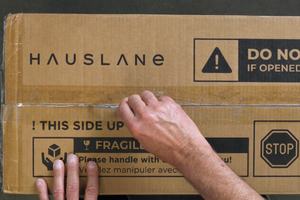How to Choose the Best Range Hood Filter?
There are many different types of range hoods available; from sleek ductless models to eye-catching wall mounts with tall ducted chimneys. But did you know there are also a variety of options to choose from when it comes to range hood filters? The type of filter your range hood comes equipped with will depend on its design and function. Let’s get to know the three main types of filters you’re likely to come across, their purpose, benefits, and potential drawbacks.
What We'll Cover


What is a range hood filter?
First things first, what exactly is a range hood filter? A range hood filter is the part of your range hood cleans and purifies grease, dirt, and other particles. Essentially, they capture all the bad stuff produced by the air and smoke that emits when you cook. Depending on the type of range hood you have, this air may be cleaned and recirculated or extracted to the exterior of your home.
Without a range hood and its filters, your kitchen would be in pretty bad shape with grease on the countertops, cabinets, and floors. Even worse, the air could negatively affect your home’s air quality and your health.
Types of range hood filters
The three most common types are baffle, mesh, and charcoal filters. Each with slightly different functions, but they’re all made to improve air quality.
1. Stainless Steel Baffle Filter
Stainless steel baffle filters are designed for heavy-duty cooking. These filters trap grease while helping the exhaust fan suck out smoke, steam, and odors. The grooves within the filters are designed to lift heavy grease particles up into the hood filter and change the direction of the airflow, trapping it from falling onto your cooking surface and into your food.
2. Aluminum Mesh Filter
Aluminum mesh filters are excellent for everyday cooking and medium use. The filter works by using two layers of filtration: aluminum mesh and activated charcoal. The aluminum mesh serves as a support structure for the charcoal and helps to trap larger particles like grease and oil. As air is drawn through the range hood and passes through the filter, the activated charcoal in the filter absorbs any odors, smoke, and other toxins before recirculating air back into the kitchen.
3. Charcoal Filters
Charcoal filters are typically found with ductless range hoods and are made of carbon-based material. This allows them to filter out contaminants and deodorize any odors produced during the cooking process.
Browse Range Hood Filters
From Hauslane
How often should I replace range hood filters?
How often you replace your range hood filters will depend on how often you cook, the type of filter, and the manufacturer recommendations. As a general rule, you can expect to replace filters every six months (excluding charcoal filters). Here are a few more factors to consider:
- Range hood usage: If you cook often and/or use high levels of heat, your filters will accumulate more grease, smoke, and other particles. In that case, you'll need to change your filters more often than someone who cooks only a few times a week.
- Filter type: Due to their specific purification process, charcoal filters cannot be cleaned. Instead, these filters will need to be replaced on an average cycle of 2 months or so, depending on your cooking frequency, or as you see needed.
- Manufacturer recommendations: Be sure to check your range hoods manual to review the manufacturer's recommendations for replacement.
- Visual inspection: Check your filters for buildup of grease and particles. Look for wear and damage as well. If the filters appear dirty, clogged, or damaged, it's time to replace them.

How do I clean range hood filters?
You can clean mesh, aluminum, and steel baffle filters by hand. Keep in mind many baffle filters are dishwasher-safe so you can save yourself some time by running them in your next dishwasher cycle.
To clean filters by hand, start by removing them from the range hood based on manufacturer instructions. Then, rinse them under hot running water. Next, soak the filters in warm, soapy water to help break up any debris.
After you’ve soaked the filters, you’ll prepare a solution of equal parts warm water and mild dishwashing detergent. Place the solution in a bowl or other container large enough to hold the filters. Submerge the filters in the soapy solution for 15 minutes.
After 15 minutes, remove the filters and use a non-abrasive brush or sponge to clean them. Rinse the filters thoroughly to remove any leftover grease and soap. You can pat them dry with a towel or set them on a drying rack to finish the cleaning process. Once dry, carefully reinstall the filters.
Remember: charcoal filters can’t be cleaned so you’ll need to replace them per manufacturer recommendations.
Which range hood filter is best?
It all comes down to your cooking style and needs. Charcoal filters are great for home cooks who prepare light meals and don’t have ductwork in their kitchens. Those who love to stir fry and try out complex dishes will likely prefer stainless steel baffle filters. If you do a little of both, you may like a model with aluminum mesh filters. Ultimately, we recommend first selecting the range hood that suits your kitchen’s construction (i.e., ductwork or no ductwork), layout, size, and cooking habits. From there, you can compare the type of filters that come with each model and narrow down your options.
Not sure which range hood model you should choose? Check out our essential buyer’s guide, where we break down everything you need to know before you buy.








